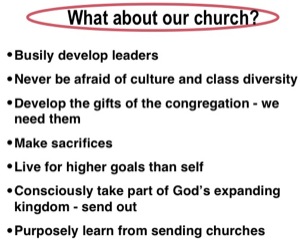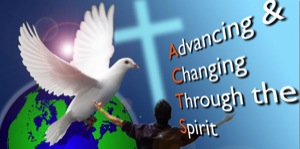
Book of ACTS
The Antioch Church: A Model for our Churches
The Bible Teacher's Commentary
Acts 13:1-3 (11:19-30)
Paul J. Bucknell
Purpose: A Bible exposition of A Mission Church (Acts 13:3) highlights how the Antioch Church was a model for a mission-minded church. They were open to sending their best leaders to various parts of the world (Part 5 of 5).
Introduction Acts 13:1-3 | Leadership Acts 13:1 | Diversity Acts 13:1 |
God-seeking Acts 13:2 | Mission-minded Acts 13:3
Video Podcast on Acts 13:1-3
D) A Mission Church (Acts 13:3)
“Then, when they had fasted and prayed and laid their hands on them, they sent them away” (Acts 13:3).
Strategic
When the Lord speaks, the people respond. Usually but not always. It was not easy to send these gifted teachers off. We do not know what time frame they would be away or whether they would ever come back. This was a whole new thing, to send missionaries to the Gentiles. Many of them moved into Gentile areas due to persecution but these would voluntarily go.
They started by going to Barnabas home area of Cyprus (Acts 4:36). Any dialects or special customs could be taught Saul. Barnabas seemed to be the leader of the team as they went out. It would not be long before Saul’s leadership came into full play. Our churches need those like Barnabas that would train someone that would be able to be left quietly behind in the dust.
Dependent on the Lord - fasted and prayed
One might think that since God had directed them, that is all there was to be done before sending. Not true. They rightly discerned that this would be a spiritual battle. Fasting and prayer were needed to rightly prepare their hearts. Prepare for what?
 On missionary trips one can face all sorts of things. Away from home, support and friends, one is all the more prone to be attacked. Even in this modern day, I have met up with all sorts of crazy things. A typhoon (cyclone) that killed over 1,000 Indians. Somehow we got through but found out on our return trip that many were killed. We had just enough money to pay for gas for them to drive another 10 hours to an airport to leave.
On missionary trips one can face all sorts of things. Away from home, support and friends, one is all the more prone to be attacked. Even in this modern day, I have met up with all sorts of crazy things. A typhoon (cyclone) that killed over 1,000 Indians. Somehow we got through but found out on our return trip that many were killed. We had just enough money to pay for gas for them to drive another 10 hours to an airport to leave.
Waves of persecution flooded the land of Orissa, India after my third trip there. The land after one year is still not restored. Desolated homes, church buildings and Christian business are left alone.
Problems of languages, travel and exchange of money. Getting use to different climates, humidity and bugs. And of course, getting use to foods and avoid getting sick. One can travel today in 5 star hotels if you are in the major cities and have accounts to pay for them, but when you step out into the rural lands, you are in need of much prayer.
When I go, I have many people praying for me, not just on this side of the Atlantic Ocean but where I am going and from people all around the world. Barnabas and Saul were going to spiritually uncharted areas. I go where brothers have invited me. The evil one will do his utmost to keep us from going to these lands where the Gospel has not gone.
Supported by the church - laid their hands on them
The symbol of laying hands on another means to impart special grace to those with their hands on their head. This further strengthens their dependence upon the Lord, but it is more. It stands for the church that is with them.
There are independent missionaries who brave the seas on their own, but the proper way is to be sent out by a church, a group of individuals behind the purpose of that individual, couple or team. Today, with modern communication this can be expanded to mean those from many churches as I formerly alluded. But this is not just for prayer. Something else is happening.
The missionary, the sent one (the meaning of apostle), is an extension of the congregation. The church itself is one body and extends its arms and legs through the missionaries it supports. 
Although this is spiritually true, it is unfortunately not often understood by the congregation. Barnabas and Saul were an extension of that Antioch church. It was as if the Antioch Church was going over to Cyprus to preach the gospel. It is not practical or possible that this would happen. Not every one is gifted for such demanding physical, emotional and spiritual rigors of life, but through those two they could in obedience to the Lord expand God’s kingdom. When a church understands why she lives, it can make such a difference.
I was recently watching the movie of the missionary, J. O. Fraser (the book is Behind the Ranges), who reached the Lisu people. He was being driven into desperation and almost gave up, but then a church group started regularly praying for him. God did a wonderful work through him, but he had needs for spiritual support.
The church needs to recognize what their goals are and to fully support those they lay hands on. We need to pray that God would do more and raise up more from our midst. But first, can we clarify one of our main purposes for existence as a church is to expand God’s kingdom and a primary way to do this is through those missionaries we support. Finances seems to be the biggest way to support, but it is one of the most minor.
Sent away
They were strategic in sending away Barnabas and Saul. They were certainly gifted. God picked them. But there is something far greater that is happening here. God has a worldwide plan and has commanded His church to carry it out. No one should ask if they like it. That is not the point. No one should ask if they have money for retirement. These are inconsequential. Something much greater is happening that requires all our efforts.
God has likened the bringing of people into His kingdom as a mother giving birth. When the mother is ripe and ready to give birth, no one can tell her to put it off. When the time comes to send, we hate the emotions and affect on our congregation, but we still send them forth. Something greater is happening that requires our attention. The mother is ready to deliver and we must pay attention to what is happening.
The gospel has gone nearly to every place in this world, but still so much work needs to be done. If I can, let me use a personal example. The Bengali people are the greatest unreached people in the world. With nearly 230 million speakers, the gospel is just beginning to penetrate this vast world. There are many working with those from Nepal where I am going, but few with the Bengali. They have, up until recently, been resistant to the gospel of Christ.
God, now however, is reaching into their desperate and broken hearts. Like an expectant woman ready to give birth. Now is the time. We must reach out to them. God is working. Would we dare not move to give so that the woman might safely give birth. But this is not one or two children, but the birth of the whole great Bengali church. May it arise! And so it goes on and on. Each culture, one by one, become one of the nations the Lord is winning His loyal followers.
The urgency of missions is upon us and will be upon us until the end of the age. We should capture this special time to meet this urgent need. My life is not about me and my comfort or even the comfort of my family. Greater things are happening. We must consider the kingdom which we have been born into so that others might come to know the Lord and grow up into Christ’s image.
The Antioch church was a sending church and so should we. It is not enough to send others, we need to send out our own so that we can contribute to the worldwide growth of the church of God.
Application
-
Do we have the vision to send?
-
Have we prioritized our resources?
-
Are we ready to send our young?
-
Are we prepared to go?
Summary
We started by asking two questions, “Is what God did in Antioch reproducible?” and “What is the intention or design of the church?” As we looked at the church in Antioch, we see that it set out for us a model in a number of significant ways.
- A Developed Church (Acts 13:1)
- A Diverse Church (Acts 13:1)
- A God-seeking Church (Acts 13:2)
- A Mission Church (Acts 13:3)
If a church lacking the great wealth, knowledge, peace, Biblical knowledge and resources and security of a great growing church, could grow and become a model for us, then we should all the more humble our hearts and get back to our roots. God doesn’t need all those things which we say we need to have.
We need to better appreciate how to develop team members and work together. We need to not allow our former worldly biases influence the way we think, treat or work with others. We want the best for all. We want to be a spiritually sensitive church. Instead of depending on our own resources, we need to go back to the Lord and learn to wait on Him.
Lastly, we need to be a church that us greatly motivated by Christ’s command to make disciples of all the different ethnic groups around the world. This mission should make up a growing portion of our budget. God’s mission needs to be our mission. We need the devotion of those forefathers of modern missions who when they sent their children to China or Africa could well guess that they would not return because they would die.
The Antioch church remains to be a model for us. And because it does not rely on man’s wisdom or strength, but on the Spirit of God, then it is quite reproducible. Perhaps not in the exact leaders or diverse group they were, but it can in a very general way in that we see God building us up, equipping us to start other churches and sending our best away to further the expansion of the kingdom of God.
Here is a friend’s love for developing leaders and churches seen in his comments on a retreat.
Launch of a two-year training process for thirty handpicked church leaders representing 15 different denominations. I cannot tell you how encouraged I was to spend a few days with these men. They are not only responsible for mission and church planting efforts for their denominations, they are personally active in planting churches, multiples of them, with thousands of people coming to faith! We are working with them twice a year for two years in moving the vision and ability to multiply, to every church in the nation. - DS
How are we participating in God’s great work?
_________________
This mini-series on Acts 13:1-2 ends here but continue reading in Acts!
=> Acts 13:4-12 Power Encounter
=> Acts Outline
BFF -> Moving our generation's heart and mind closer to the Lord through the powerful truths of God!





